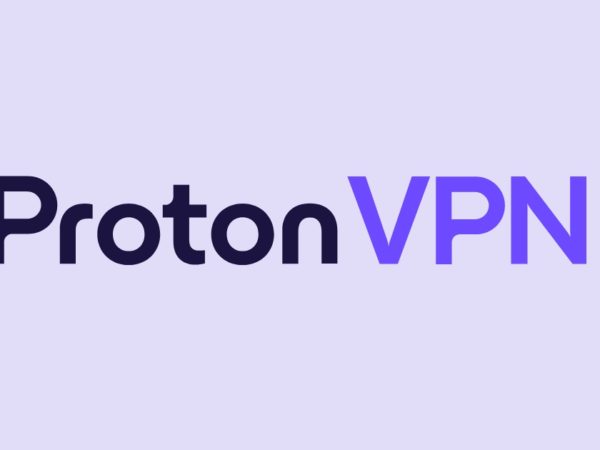<img alt="atlasVPN" data- data-src="https://kirelos.com/wp-content/uploads/2023/10/echo/atlasVPN.jpg/w=800" data- decoding="async" height="420" src="data:image/svg xml,” width=”800″>
A brief hands-on with AtlasVPN, depicting its features and real-life performance.
Once a niche concept, the current cybersecurity threatscape has made VPNs a must-have tool for internet-savvy folks, especially if you connect to different networks.
It’s become an essential piece of software for someone hopping in and out of public or free WiFi zones. It can be hotels, airports, colleges, or your nearest cafe. There are many ad-hoc networks with deceiving names like “Free WiFi,” which people connect to thinking it’s a legitimate hotspot.
But in fact, it’s a trap set up by some scammer sitting beside a laptop or even just a smartphone. Users connect, exposing their web activities to the scammers, including their login details or credit card numbers, based on the website they visit during that internet session.
The solution to all this internet anarchy is a VPN.
In a nutshell, a good VPN protects your web activity from everyone alike, be it your ISP, government, or a hacker. These tools convert data (plain text) into a puzzled, unintelligible form (ciphertext) with the help of state-of-the-art VPN protocols.
Though all this is highly technical, all a user does is select a preferred server location and click connect.
However, there are a few parameters to gauge if a VPN is indeed what it says. Let’s put AtlasVPN’s free premium plan under that scanner.
AtlasVPN: An Overview
Founded in 2019, AtlasVPN is comparatively new in the industry. Soon after its launch in 2021, it merged with Nord Security, joining hands with other cybersecurity tools, such as NordVPN, Surfshark, NordPass, etc.
At a quick glance, its feature list seems good. Here are some noteworthy ones:
- Global server network: 1000 servers in 49 locations
- Kill switch: Disables internet if VPN encryption drops
- No-logs policy: Users’ online activity can’t be traced back to them.
- Streaming optimized servers: Buffering free experience
- Unlimited connections: Single subscription for all of your devices.
- Auto IP rotation (SafeSwap): Assigns new IP addresses for better anonymity.
- Malware blocker (add-on): Blocks advertising trackers and malicious content.
- Split-tunnelling (Android): This helps to use VPN encryption selectively
- Advanced multihop: Picks a random exit VPN server.
- Perfect forward secrecy: Rotates encryption keys for isolated VPN sessions.
- AES-256 & ChaCha20 encryption: Best in class encryption algorithms.
- Cross-platform presence: Applications for Windows, macOS, Linux, Android, iOS, AndroidTV, and Amazon Fire TV.
It covers most everyday security essentials. Still, it would be great to see split tunneling everywhere, not just on Android. In addition, Tor over VPN could be a great addition.
Finally, server obfuscation, where VPN traffic is masked as normal web activity, avoiding suspicion and blocking, can really come in handy in authoritarian regimes.
Before beginning with the actual hands-on, I should point out that AtlasVPN is based out of New York, USA, and is a member of surveillance alliances, such as Five, Nine, and Fourteen Eyes.
Ideally, this isn’t something security advocates prefer.
In the past, there have been cases where governments of these countries have forced VPNs based on their soil to collect user data, which in some cases also resulted in criminal prosecution. But if you’re an average user aiming for safe public WiFi sessions, AtlasVPN might just be a perfect fit (we will find out).
So, if you are okay with this fact, jump on the following sections where we test the AtlasVPN Windows application.
You can register using an email address and pay with a card, Paypal, Google Pay, and cryptocurrencies.
I have subscribed to their one-month plan without the addons (ads & malware blocker, and data breach monitor), which would have added another $4.99 to the overall bill.
Finally, I downloaded the Windows application and signed in using the registration email address.
User Interface of AtlasVPN
The UI is clean. One can scroll the list of servers and click to connect. It shows Recent Connections, which is helpful.
One thing it could’ve added is favorite servers. Besides, it would’ve been great to see the % load to identify the least crowded servers for better speeds.
A one-of-a-kind thing is that AtlasVPN allows you to pause a VPN connection.
I have never seen anything like that, and it’s great to see something entirely unique with Atlas VPN.
Overall, it’s intuitive; even beginners should feel right at home. That said, it can definitely add more advanced features in the coming updates.
Features of AtlasVPN
#1. Kill Switch
AtlasVPN has a passive Kill switch, which terminates internet activity in the event of a VPN connection glitch.
However, this does not cover cases where a user mistakenly disconnects, which would be an active kill switch.
So, while it serves the purpose, the additional flexibility to turn off internet access whenever there is no VPN connection would be nice.
#2. Protocols
Protocols are the engines of VPN applications. In other words, these clients are just a graphical interface to use the underlying algorithms offered by specific protocols.
Straightaway, AtlasVPN’s protocol list is short, with just two options: WireGuard and IPsec/IKEv2.
WireGuard is one of the most recent and sought-after protocols because of its superior network speeds. In addition, its lightweight codebase can be easily audited.
Interestingly, some leading VPN service providers modify WireGuard. But I couldn’t find it on their website whether AtlasVPN has done any tweaking in the default WireGuard configuration or using it as-is.
Their support was prompt to clear any doubts, however:
The next one, IPSec/IKEv2, is a fast protocol, allowing quick connection migrations between cellular and WiFi networks. Still, it’s developed jointly by Microsoft and Cisco as a closed-source project, which is enough to raise fingers against its privacy benchmarks.
Besides, I was surprised not to see OpenVPN on that list. For those new, OpenVPN is the most time-tested protocol all leading VPN providers provide. It’s also more potent in bypassing geo-restrictions.
Overall, AtlasVPN protocol offering is decent, but a few things, like the OpenVPN addition, can make it even more enticing.
#3. SafeSwap and MultiHop
SafeSwap automatically rotates IP addresses throughout an online session for added privacy. It’s for additional protection where your internet activity isn’t attached to one but multiple anonymous IP addresses.
Currently, AtlasVPN has SafeSwap servers across the Netherlands, Singapore, and the United States.
Multihop is another privacy-friendly feature to double encrypt the web traffic. This routes the data via two VPN servers in contrast to a single VPN server used in standard connections.
AtlasVPN Multihop is an update over the traditional multi-hop arrangement. It randomly picks the exit server and rotates that to make it even more effective. You can choose from Europe and North America servers to use Multihop .
Note: Using multihop servers can have a negative impact on the network speeds, owning to the extra encryption layer.
#4. IP and DNS Leak Test
Every internet-connected device has an IP address. It’s a digital identifier to find out any device’s approximate location. Consequently, it’s the first thing VPNs are made to disguise.
I have logged on to Browserleaks to check if my current VPN connection is leaking anything.
AtlasVPN performed well and masked everything. You can see the IPv4 & IPv6 fields show the VPN server credentials and not mine.
Similarly, it covered WebRTC leaks as well.
Next, I moved on to check about any DNS leaks. In a nutshell, DNS servers are the middlemen that matchmake IP addresses with domain names.
Every time we visit any website (e.g., geekflare.com), the request (DNS query) goes to the DNS server, which returns the associated IP address (ex. 87.24.114.245). This output IP is used by our machines to load the subject website in the browser.
AtlasVPN did not allow any DNS leaks for the connected server.
Overall, there wasn’t any issue with the IP and DNS leaks, and AtlasVPN nicely handled the basic privacy requisites.
#5. Encryption
When live, our machines send and receive information in the form of data packets. Some of these are encrypted by default without any user-initiated action.
However, a few of them go without any protection, revealing our IP address, operating system, browser agent, etc., besides the websites we visit.
Additionally, one can snoop over the DNS queries.
To cover for this information leakage, VPNs deploy encryption.
I connected to the AtlasVPN Singapore server and analyzed the traffic via a network sniffer tool, Wireshark.
You can see the encryption in action:
I had “Auto” turned on in the protocol settings, which sent every packet via WireGuard. It encrypted everything except my IPv6 address.
This is a common issue I have found even with top players who state IPv6 support upfront.
In this case, you can simply disable your IPv6 address. But remember, you won’t be able to access anything which solely connects with IPv6 addresses. Although, the possibility of such an event is low since IPv4 is still the dominant version in practice.
This concludes the encryption section. In the end, you should take care of the IPv6 address (if you have any), and we’re good with AtlasVPN.
#6. Speed Test
It’s customary to do speed tests with VPN reviews. But let me tell you, they are the most inconsistent piece of information in any VPN hands-on. There are a number of reasons behind this. First, the VPN server load varies. Second, the load on the target server (the website you visit) also fluctuates. In addition, there are many hardware and software configurations that have a say in the speeds we finally get.
Still, let’s see how it fares with me, even if it can behave totally differently with anyone else.
| Server | Download speeds (Mbps) | Upload speeds (Mbps) | Approx. distance (km) |
|---|---|---|---|
| Base | 83 | 41.5 | 0 |
| London | 37.5 | 5.5 | 6,700 |
| Hong kong | 41.5 | 6.5 | 4,000 |
| Singapore | 42.5 | 8 | 6,200 |
| Australia | 42.5 | 5.5 | 8,400 |
| Austria | 45 | 4.5 | 5,700 |
| SafeSwap. Singapore | 38 | 6 | 6,200 |
| Multihop. Europe | 35.5 | 5 | NA |
| Multihop. North America | 42 | 2 | NA |
These results indicate the mean of two trials conducted for each server location. Besides, I did the entire speed test in one go to achieve better consistency.
While the distance has an inevitable damaging effect on speeds, the upload ones have struggled a bit too much.
For context, Netflix recommends download speeds of 15 Mbps or higher for a UHD 4K streaming. Likewise, YouTube suggests speed exceeding 8 Mbps for 1080p uploads.
Atlas VPN Alternatives
Here are a few options you can consider in addition to AtlasVPN. Please remember all these options have basic capabilities like a kill switch, split tunnelling, 30-day money back, and more.
Therefore, I will mention only not-so-common features.
#1. ExpressVPN
We have tested ExpressVPN at Geekflare, and it stood its ground at almost every front a consumer cares about, except one: its industry-leading price tag.
Leaving that aside, it has blazing-fast speeds, intuitive UI, robust geo-unblocking mechanisms, RAM-only servers, and 24/7 support. Additionally, ExpressVPN boasts a worldwide server network in over 90 countries.
What we felt could make it even better are features like server obfuscation, Tor over VPN, and multihop.
Check out my ExpressVPN review for a deep dive.
#2. NordVPN
NordVPN is a good AtlasVPN alternative, which, in fact, belongs to the same Nord Security family.
It has a wholesome list of features, including a worldwide server network, ad & malware blocker, dedicated IP, double VPN, private DNS, SmartDNS, Tor over VPN, etc.
Besides, NordVPN offers server obfuscation to break through oppressive geo-blocking in authoritarian regimes. Moreover, you get Tor over VPN for the best possible privacy.
Overall, NordVPN leaves little to be desired and gets frequent mentions here at Geekflare.
#3. Surfshark VPN
Yet another member of the Nord Security family, Surfshark VPN, comes with unlimited connections per subscription, just like AtlasVPN.
Surfshark covers the basics quite well and offers additional features like ads & malware blockers, private DNS, server obfuscation, and more.
Besides, this also provides RAM-only servers, rotating IP, multihop, and static IP.
Lastly, Surfshark has a portfolio of products in addition to its VPN, which include antivirus, dark web monitor, private web search, etc.
You can check more in our Surfshark One hands-on.
#4. ProtonVPN
My personal favorite, ProtonVPN, has an exhaustive list of goodies to offer to every VPN user.
You get a limited-powered free forever plan to test the waters before jumping in.
It has native malware and ad blocking, double VPN, Tor over VPN, server obfuscation, excellent UI, and more. Furthermore, ProtonVPN apps (Windows, macOS, iOS, & Android) are open source and have been audited by third-party security services.
ProtonVPN is also particularly good at providing access to geo-locked entertainment.
You can check more in our detailed ProtonVPN review.
Final Thoughts
AtlasVPN is one of the few VPNs having a generous free tier, allowing you 5GB of encrypted data transfer per month. In addition, the paid plans have no cap on the number of devices you can use.
On the other hand, you don’t have the OpenVPN protocol, and the network speeds suffered more than what I have observed with its peers.
But subscribe to it for a 3-year plan, and it (currently) bills a pocket-friendly $1.83 a month.
If you’re still confused, look at some factors to consider while shopping for VPNs.



